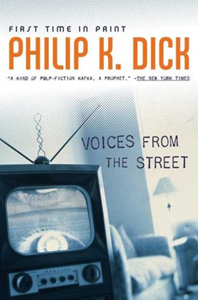“Voices from the Street” (written in 1952, published in 2007) was Philip K. Dick’s last published novel — finally hitting shelves a quarter-century after his death. One might therefore assume it’s a middling curiosity, but it’s actually an outstanding achievement, all the more amazing because Dick wrote it when he was 24, about the same age as his protagonist and stand-in Stuart Hadley.
The sprawling character piece is like a more muscular answer to J.D. Salinger’s “Catcher in the Rye” (1951) — raising the question of why publishers considered it to have no audience at the time — and it also calls to mind modern movies such as “Office Space” (1999) and “The Good Girl” (2002).
Hadley is really depressed
Jennifer Aniston tells the 20-something Jake Gyllenhaal in “The Good Girl”: “Sure, I’m depressed. But you’re really depressed.” I was thinking of that line when reading about the exploits of Hadley, who is really depressed, anxious, frustrated, angry, empty and confused about the world. (And in another parallel, he hooks up with an older married woman.)

“Voices from the Street” (2007)
Author: Philip K. Dick
Composition year: 1952
Genre: Coming-of-age drama
Setting: Bay Area, 1952
With “Voices from the Street,” PKD might’ve accidentally written an argument for the value of mental-health drugs and counseling — things that were mainstream by the time of the book’s publication but not in 1952.
Bay Area resident Stuart is married to Ellen, has a young baby Peter, lives in a decent apartment and manages a TV sales and repair store, all because he feels he’s supposed to. Most of PKD’s works are both funny and sad, but “Voices” is more aggressively so.
It’s like Stuart’s life is happening to him — in part because he is handsome, well-dressed, well-groomed and things come easier to him than to others. But he’s aware he’s not a fully formed person, and that eats away at him. Consider this laugh-out-loud yet extremely dark reflection from Hadley on page 238: “In the first months of their marriage he had been terrified that someday he would meet (his wife) on the street and not recognize her.”
“Voices” raises that tricky question: What part of a person’s actions are their fault, and what part is the faulty wiring in their brain? A bevy of people are in Stuart’s sphere, and it’s possible that none of them could’ve helped him anyway.
Deep supporting cast
Still, this is an outstanding supporting cast, driven by PKD’s knack for recognizing the way people behave and how it affects others. Most memorable is Bob, the husband of Stuart’s sister, Sally — about whom he adores everything except her choice in a husband.
Successful real-estate wheeler-and-dealer Bob is brash and loud, so much so that Stuart’s lower-class arty friends, Dave and Laura Gold, are totally cowed and destroyed simply by being ignored and minimized in Bob’s presence over lunch.

People have different theories about how to help Stuart, or how they’ve failed him, both before and after his store-window-smashing mental breakdown that serves as the story’s climax.
Ellen resolves that she loves Stuart and will stay by his side no matter what; Sally believes she quashed her brother’s angry streak when he was a kid, and now it’s dangerously bottled up; influential but tired religious leader Theodore Beckheim tells Stuart he must help himself, no one can do it for him; and Marsha exemplifies all the false “grass is greener” promises of an affair.
Most puzzling is Jim Fergesson, Stuart’s boss at the TV store. He’s loud and angry, but not on the level of Bob; he’s capable of recognizing other people’s existences. He fires the unstable Stuart, as many bosses would do when an employee skips work to go on a lost weekend. But after Stuart’s horrifying breakdown, Jim blames himself.
Cursed with immaturity
This smacks a little bit of the immature idea of “Well, I’ll show him. Once I’m gone, he’ll realize how much he needed me” — especially since Fergesson indeed can’t operate the store without Stuart. This doesn’t quite jibe with the story’s previous assertion that there are lots of people at the business college across the street looking for jobs. But it could also be that the old-school Fergesson is bad at the hiring process; he had been established at being bad at choosing where to place ads.
I might be going a little too hard on PKD with the assessment of “Voices” as a “Well, I’ll teach them a lesson” narrative. That said, it’s almost like the author needed to get “Voices” out of his system — like the book itself is his safe version of Stuart’s breakdown.
The version of Jim in “Humpty Dumpty in Oakland” (1960, 1986) is much mellower (although he’s still obsessed with business expansion), as is the version of TV/radio repairman Olsen in “Puttering About in a Small Land” (1957, 1985). (Here, Olsen swears creatively and constantly and hates humanity.)
It’s like PKD learned to not merely observe, but also to sympathize with and understand these people in later books. In short spurts, people can be like Bob and totally dominate and belittle everyone around them — that restaurant scene is a spot-on slice of life. But most people are not that exhausting, not all the time, especially if you have compassion for them — as the self-centered, pre-breakdown Stuart does not.
“Voices” opens with a paragraph where Fergesson walks down the sidewalk to open his shop in the morning, a chunk of writing PKD would later repurpose for “Humpty Dumpty.” He probably assumed “Voices” would never be published, and therefore he cannibalized that passage for his ninth and final attempt at getting a non-SF work published.
However, the rest of the book does not feature textual repeats; PKD’s favorite themes (and character names) are definitely present, but I can’t say I ever knew exactly where “Voices” was headed.
A little overwritten
It is arguably a little overwritten. If people did fan edits of books, “Voices” would be a candidate. On the other hand, this was our first exposure to fresh PKD writing since the 1994 publication of “Gather Yourselves Together” (written in 1950, it’s the one novel that pre-dates this one). No one wanted it truncated.
And as long as it is (301 dense pages), “Voices” is always rich and forward-flowing, as Stuart’s various paths coalesce into a conclusion the possibility of which creeped into the back of my mind. At the end of the Mike Judge comedy “Office Space,” Ron Livingston’s protagonist quits his desk job and goes to work on a construction crew, appreciating the fresh air and bucks.
It puts him in a lower economic bracket and perhaps offers less opportunity for advancement, but it fits his mental makeup. Stuart makes a similar realization about himself: John Q. Public’s path to happiness is not his own path to happiness. So he moves to a crappy farm town and resolves to open a shop for whatever is locally lacking — be it shoe repair or whatever.
In a lot of PKD books, the insanity of that book’s specific events are too much for the protagonist. Here, normal daily life is too much for Stuart because of how his brain is wired. Modern pharmaceuticals and therapy can help men today, as the social stigma of mental-health problems is almost gone, especially in a place like the Bay Area.
In 1952, that was not the case, so — in a fascinating contrast to PKD’s warnings about the future — “Voices” stands as a cautionary tale of how things used to be.

